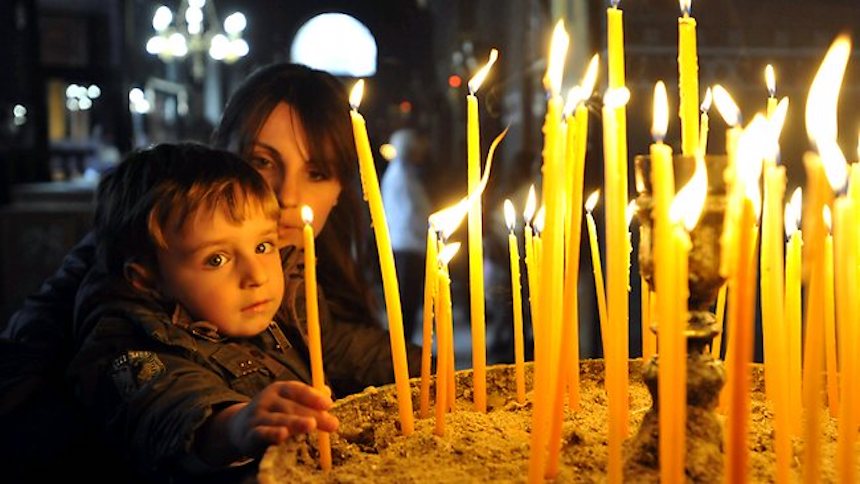You don’t know Jack


I was recently a guest on two episodes of The Counsel of Trent podcast to talk about C.S. Lewis. We spent the first episode simply talking about his life. Lewis was a man who left an indelible mark on the Twentieth Century. However, despite being such an influential figure, today many people only know him for his Chronicles of Narnia, and almost next to nothing about the man himself.
Therefore, in this article I would like to introduce you more fully to the man behind the Lion, and the author behind works which have deeply shaped modern Christianity and apologetics. If you would like to listen to the audio version of these articles, click here.
1. He wasn’t English
Often I have found people assume that C.S. Lewis was English, particularly if they have listened to one of the few remaining audio recordings of him. Lewis was, in fact, born in Belfast, Northern Ireland in 1898. He was, however, educated in England and lived in Oxford for most of his adult life.
2. He had several names…
He was baptised Clive Staples Lewis, but that wasn’t what his friends called him. When Lewis was about four, his dog, Jacksie, died. From then onwards, he stubbornly refused to respond to any other name, although it was eventually shortened to “Jack”. This is why the name of my podcast is Pints with Jack, the “Jack” in question being C.S. Lewis himself.
3. Jack experienced tragedy as a child
Lewis’ mother died of cancer when he was ten. He writes about it movingly in his spiritual autobiography, Surprised By Joy, describing it as follows:
“…all settled happiness, all that was tranquil and reliable, disappeared from my life”
C.S. Lewis, Surprised By Joy
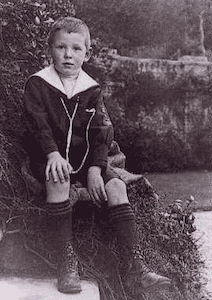
C.S. Lewis 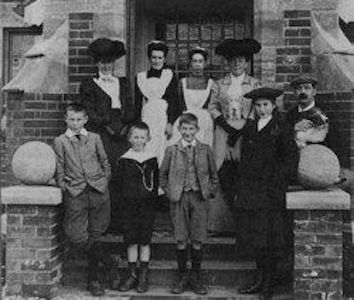
The Lewis Family 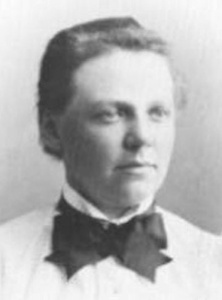
Flora Lewis
The young Jack was soon afterwards sent to boarding school in England. He disliked England immediately and hated most of his schooling, so much so that in his autobiography, he names one of the schools he attended after one of the most notorious World War Two concentration camps, Belsen. Fittingly enough, the headmaster at that school would later be committed to an asylum.
4. Lewis wasn’t always a Christian
Most people who have heard of Lewis will know that he was a famous Christian of his generation. However, he was not a Christian all of his life. He was raised in the Church of Ireland, but became an Atheist as a teenager. There were several reasons for this…
Lewis loved the old Pagan myths, particularly those of the Norse. As he received his education in classics, he was told that Paganism was all false, whereas Christianity was entirely true. Not only did this assessment seem wrong to the young Lewis, but since he saw clear parallels between the two, he assumed that both Paganism and Christianity were simply fanciful stories.
Like many who embraced Atheism, the problem of pain and suffering also loomed large in Jack’s mind. He couldn’t reconcile a good God with the world he saw around him or with the pain he himself had endured in his life. He would often quote the Epicurean poet Lucretius who wrote:
Had God designed the world, it would not be
Lucretius (Epicurean Poet)
a world so frail and faulty as we see
5. He was a war veteran
Jack fought in World War One. In fact, he arrived at the front line on his nineteenth birthday. After being wounded in combat about a year later, he returned home.
During his training he had met a young man named Paddy Moore. The two had agreed that if one of them died, that the other would look after his family. Unfortunately, Paddy did not return from the trenches. Lewis was true to his word, living with and taking care of both Paddy’s mother, Janie, and Paddy’s sister, Maureen, for the rest of his life.
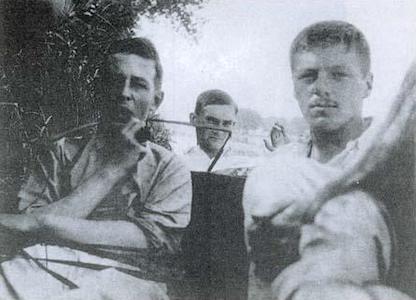
Jack and Paddy Moore 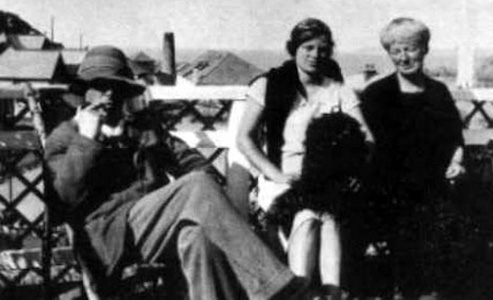
Jack with Janie and Maureen Moore
6. Jack was really, really clever…
Upon returning to Oxford after the war, Lewis excelled in his studies, earning multiple degrees. He got a First in Greek and Latin literature (“Moderations”), Philosophy and Ancient History (“Greats”), and finally in English.
It’s clear that Lewis was very intelligent, particularly when it came to language. He was, unfortunately, terrible at mathematics. In fact, his inability with numbers nearly barred his entrance to Oxford. Fortunately, upon returning from war, his military service granted him a dispensation from those exams.
7. He became a theist before becoming a Christian
Over time, Lewis started to become discontented with the imaginative and explanatory power of Atheism. He had originally embraced Atheism, in part, because of the cruel and unjust nature of the universe. However, as he would later argue in Mere Christianity:
…how had I got this idea of just and unjust? A man does not call a line crooked unless he has some idea of a straight line. What was I comparing this universe with when I called it unjust?
C.S. Lewis, Mere Christianity
Jack moved through a number of philosophical evolutions before he finally accepted the inevitable. In his autobiography he writes:
You must picture me alone in [my] room…, night after night, feeling… the steady, unrelenting approach, of Him whom I so earnestly desired not to meet. That which I greatly feared had at last come upon me. [I eventually]…gave in, and admitted that God was God, and knelt and prayed: perhaps, that night, the most dejected and reluctant convert in all England”.
C.S. Lewis, Surprised By Joy
He was not yet a Christian, but the seeds had already been sown…
8. He really loved his friends
Contrary to some depictions of Lewis, he was not an isolated stoic academic. He loved good beer and good conversation. He really loved his friends and they would play a huge role in his life, particularly J.R.R. Tolkien, the author of The Hobbit and The Lord of the Rings. In fact, Tolkien fans owe a great debt of gratitude to Lewis, as he was for a long time the only audience for these works and he did much to encourage Tolkien to finish them and get them published. Unfortunately, Tolkien disliked much of Lewis’ work, even The Screwtape Letters, a book which Lewis dedicated to him!
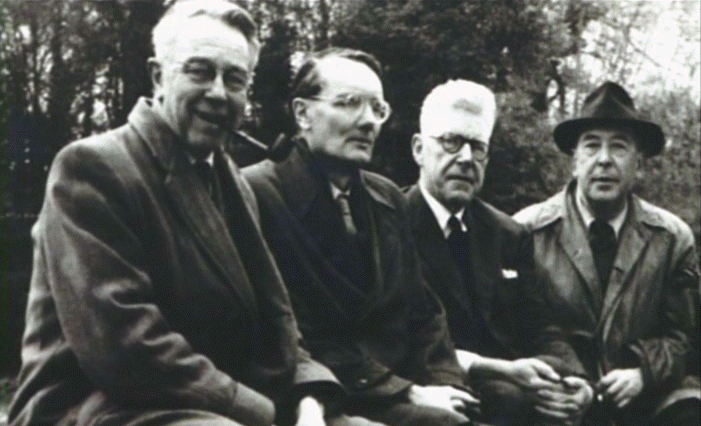
Many other names could be added to the list of Lewis’ close friends, such as Hugo Dyson, Charles Williams and Owen Barfield. All of these men shared a love of literature. In The Four Loves, Lewis would write:
Friendship is born at that moment when one person says to another: ‘What! You too? I thought I was the only one!’
C.S. Lewis, The Four Loves
Later these men would come together to form The Inklings, a literary discussion group where they would debate ideas and where they would read their work to each other. They would meet on Tuesday mornings in their favourite pub, The Eagle and Child, affectionately known to locals as The Bird and Baby, but they would also meet on Thursday nights in Lewis’ rooms at Magdalen College where they’d have a drink and smoke.
9. Speaking of smoking, Lewis really loved tobacco
I recently came across a biography of Lewis which estimated that he smoked sixty cigarettes a day! Now, since I’m marginally better at mathematics than Lewis, I sat down and worked out that, assuming he was awake for 14 hours a day and that it takes approximately five minutes to smoke a cigarette, that he spent a third of his waking life smoking!

Last year I visited Lewis’ home and although they had repainted the walls in the living room, they left the ceiling untouched so you could see how it was thoroughly stained by the nicotine!
10. His friends helped bring him to Christ
After converting to Theism, Lewis began to suspect that Christianity might be true. However, it was after a long, late-night conversation with Tolkien and Dyson that the last major obstacle was removed. Lewis had regarded Christianity as a myth like any of the other Pagan myths – “lies breathed through silver” – emotionally moving, but false.
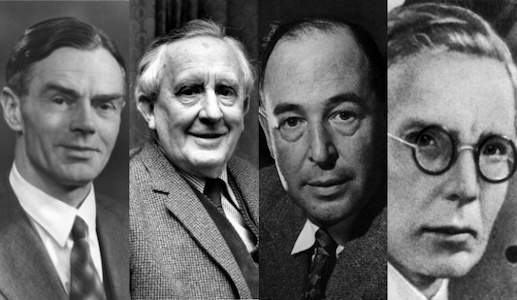
Over the course of their conversation, Tolkien and Dyson helped Lewis see that Christianity was the true myth. For centuries before Christianity, man’s myths had intuited a dying and rising God. However, in Jesus of Nazareth, that myth became fact.
That’s the end of the first part of this series! The concluding part will be published tomorrow…
Part 1 | Part 2











